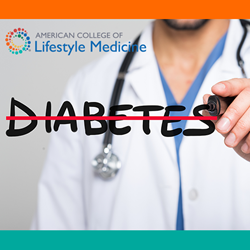
“A patient does not give fully informed consent if a Lifestyle Medicine option is not presented to them.”
ST. LOUIS (PRWEB)
November 11, 2020
The American College of Lifestyle Medicine (ACLM), as part of its effort to directly address health disparities and the risk of vulnerable populations to COVID-19, has announced a Type 2 Diabetes Bill of Rights to raise consumer awareness for the right to evidence-based Lifestyle Medicine therapeutic approaches and education as a first-line treatment option.
The Bill of Rights is a companion to ACLM’s recently launched “Reversing Type 2 Diabetes and Insulin Resistance with Lifestyle Medicine” 18-hour, 20-module, evidence-based CME/CE accredited online course for physicians and health professionals. This is the first comprehensive educational curriculum offered to equip physicians and other health professionals to treat and reverse type 2 diabetes and insulin resistance. In addition, ACLM recently published a position paper, “Type 2 Diabetes Remission and Lifestyle Medicine: A Position Statement From the American College of Lifestyle Medicine.” ACLM will also present a free webinar, “The Reversibility of Type 2 Diabetes with Lifestyle Medicine—Q & A” on Thursday, Nov. 12 at 12 p.m. CST.
ACLM defines Lifestyle Medicine as the use of an evidence-based, whole food, plant-predominant dietary lifestyle, regular physical activity, restorative sleep, stress management, avoidance of risky substances and positive social connection as a primary therapeutic modality for treatment, reversal and prevention of chronic disease. Addressing lifestyle is the first step in type 2 diabetes and other chronic disease treatment and management guidelines, but it has been overlooked due to a lack of physician training in lifestyle, barriers to practice and a lack of consumer understanding.
“We believe that a patient does not give fully informed consent if this option is not presented to them at the time of diagnosis,” said ACLM Founding President John Kelly, MD, DipABLM, lead faculty for the new course. “COVID-19 has highlighted the vulnerabilities created by type 2 diabetes, amplifying the urgent need to restore health to those impacted by this lifestyle-related chronic disease, as opposed to simply managing it.”
“COVID-19 has exposed the long-standing issue of racial health disparities in America, as people of color have been disproportionally affected by the pandemic,” said ACLM President Cate Collings, MD, DipABLM. “While the causes of racial health disparities are many, and include the range of social determinants of health, the most devastating impact is from the significantly higher incidence of chronic disease, most notably type 2 diabetes.
“If you are talking about racial health disparities and are not focused on the disparate impact of type 2 diabetes, you are missing the heart of the matter.”
“Truly addressing racial health disparities will only happen when our nation recognizes the role of lifestyle and trains its clinicians accordingly, fully informs patients, removes the barriers to practicing Lifestyle Medicine and rewards physicians and health professionals for restoring health rather than merely managing disease,” said Kelly. “ACLM is actively addressing each of these areas.”
Diabetes has a devastating impact on the quality of life of millions of Americans. Treatment for diabetes is also a major contributor to the country’s health care spending. According to the Centers for Disease Control and Prevention, 90 percent of the nation’s $3.3 trillion in annual health care expenditure pays for the treatment of chronic health conditions, including type 2 diabetes. In the United States, approximately 30 million people have diabetes, costing the country $245 billion. Further, studies show that by 2025, there will be 294 years of life lost per 100,000 people due to diabetes, and, by 2050, the number of Americans with diabetes is expected to double or triple. Seniors, as well as ethnic minorities, are expected to have increasingly higher rates of type 2 diabetes. Type 2 diabetes is the most common form of diabetes and is caused by unhealthy lifestyle behaviors, including poor diet and inactivity.
Lifestyle Medicine’s patient-oriented focus reduces total health costs and provides high quality of life for diabetic patients. Studies have shown that whole food, plant-based diet interventions demonstrate greater improvements in quality of life and glycated hemoglobin (HbA1c) control in diabetes populations than traditional diet and exercise programs, and have also shown greater long-term adherence. Moreover, studies have demonstrated that the approach advocated by Lifestyle Medicine physicians can not only improve patient outcomes, compared to other treatment regimens, but can often reverse type 2 diabetes and reduce or even eliminate the need for prescription medication treatments, including insulin.
“ACLM addresses the need for quality, evidence-based education and certification across the medical training continuum as well as advocates for its members in their individual practices and in their collective mission to domestically and globally promote Lifestyle Medicine as the first-treatment option,” said Collings. “Our 5,000 ACLM members—physicians and other clinicians–are united in their desire to eradicate the root cause of chronic disease, much of which is based on unhealthful lifestyle choices.”
ABOUT THE AMERICAN COLLEGE OF LIFESTYLE MEDICINE: ACLM is the medical professional society for those dedicated to the advancement and clinical practice of Lifestyle Medicine as the foundation of a transformed and sustainable health care system. ACLM addresses the need for quality education and certification, supporting its members in their individual practices and in their collective mission to domestically and globally promote Lifestyle Medicine as the first treatment option, as opposed to a first option of treating symptoms and consequences with expensive, ever increasing quantities of pills and procedures. Learn more at http://www.LifestyleMedicine.org.
Share article on social media or email:

